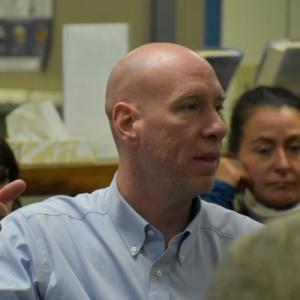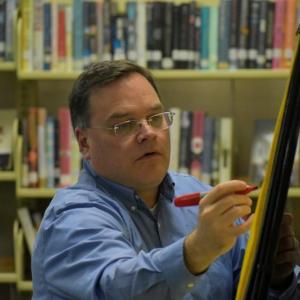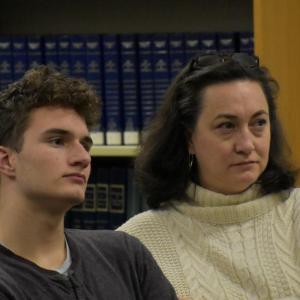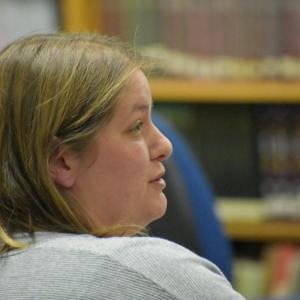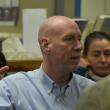Portland firm holds first public sessions on CSD’s future
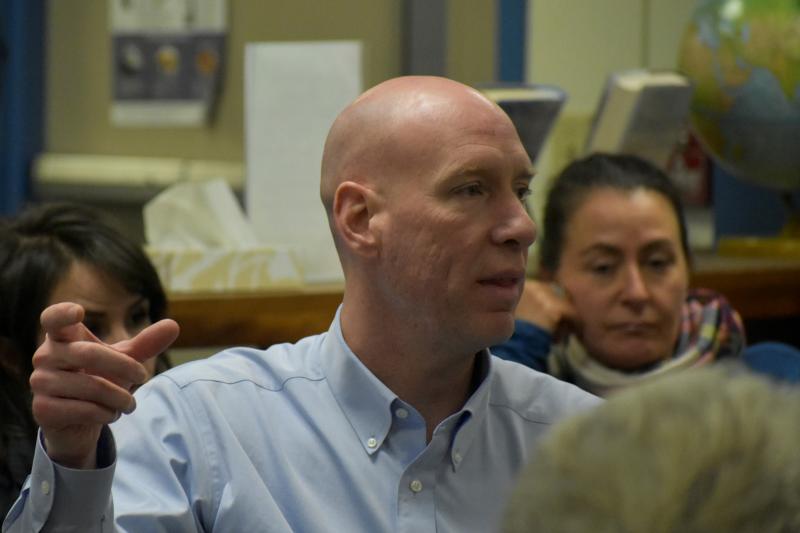 Parent and coach Brian Blethen said connectivity on the peninsula thrives, but endeavors should include connectivity off peninsula. JOSEPH CHARPENTIER/Boothbay Register
Parent and coach Brian Blethen said connectivity on the peninsula thrives, but endeavors should include connectivity off peninsula. JOSEPH CHARPENTIER/Boothbay Register
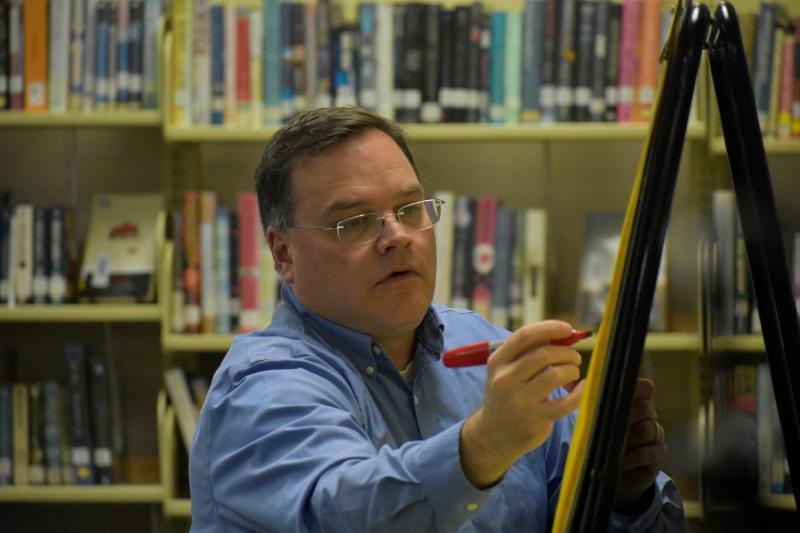 Lavallee Brensinger Architects’ Ron Lamarre takes notes during the Jan. 17 master planning session at Boothbay Region High School. JOSEPH CHARPENTIER/Boothbay Register
Lavallee Brensinger Architects’ Ron Lamarre takes notes during the Jan. 17 master planning session at Boothbay Region High School. JOSEPH CHARPENTIER/Boothbay Register
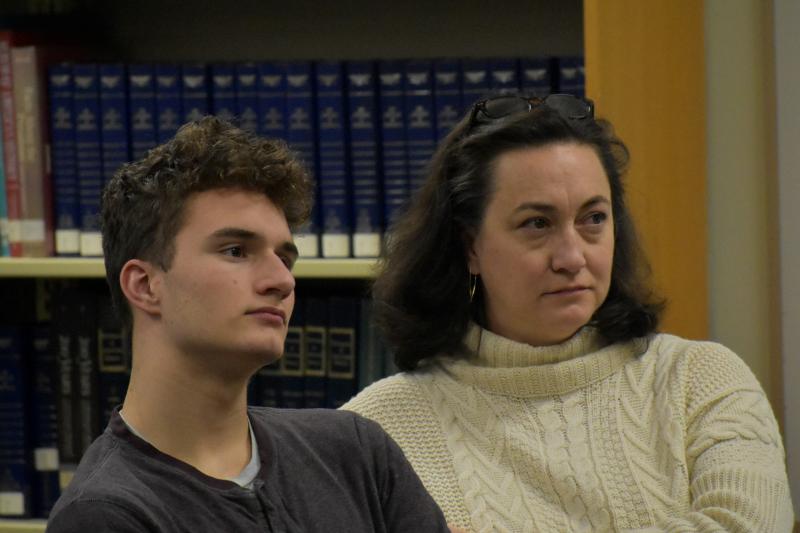 Boothbay Region High School student Rowan Kristan and his mother, Brynne, listen to Lavallee Brensinger Architects’ Ron Lamarre’s “fun and fair” pitch. JOSEPH CHARPENTIER/Boothbay Register
Boothbay Region High School student Rowan Kristan and his mother, Brynne, listen to Lavallee Brensinger Architects’ Ron Lamarre’s “fun and fair” pitch. JOSEPH CHARPENTIER/Boothbay Register
 Parent Melissa Whitt speaks about the importance of keeping the region a place where graduates will want to return. JOSEPH CHARPENTIER/Boothbay Register
Parent Melissa Whitt speaks about the importance of keeping the region a place where graduates will want to return. JOSEPH CHARPENTIER/Boothbay Register
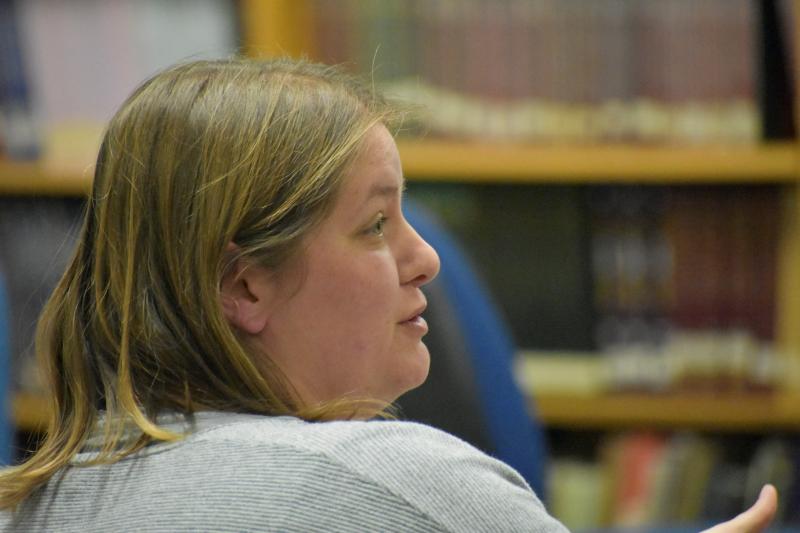 Edgecomb parent Krystle Hodgdon talks about the obstacles to the CSD’s success. JOSEPH CHARPENTIER/Boothbay Register
Edgecomb parent Krystle Hodgdon talks about the obstacles to the CSD’s success. JOSEPH CHARPENTIER/Boothbay Register
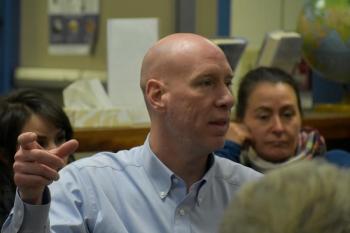 Parent and coach Brian Blethen said connectivity on the peninsula thrives, but endeavors should include connectivity off peninsula. JOSEPH CHARPENTIER/Boothbay Register
Parent and coach Brian Blethen said connectivity on the peninsula thrives, but endeavors should include connectivity off peninsula. JOSEPH CHARPENTIER/Boothbay Register
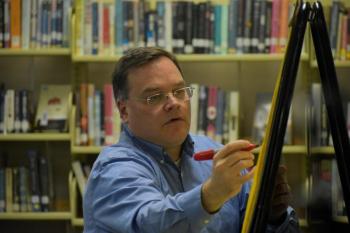 Lavallee Brensinger Architects’ Ron Lamarre takes notes during the Jan. 17 master planning session at Boothbay Region High School. JOSEPH CHARPENTIER/Boothbay Register
Lavallee Brensinger Architects’ Ron Lamarre takes notes during the Jan. 17 master planning session at Boothbay Region High School. JOSEPH CHARPENTIER/Boothbay Register
 Boothbay Region High School student Rowan Kristan and his mother, Brynne, listen to Lavallee Brensinger Architects’ Ron Lamarre’s “fun and fair” pitch. JOSEPH CHARPENTIER/Boothbay Register
Boothbay Region High School student Rowan Kristan and his mother, Brynne, listen to Lavallee Brensinger Architects’ Ron Lamarre’s “fun and fair” pitch. JOSEPH CHARPENTIER/Boothbay Register
 Parent Melissa Whitt speaks about the importance of keeping the region a place where graduates will want to return. JOSEPH CHARPENTIER/Boothbay Register
Parent Melissa Whitt speaks about the importance of keeping the region a place where graduates will want to return. JOSEPH CHARPENTIER/Boothbay Register
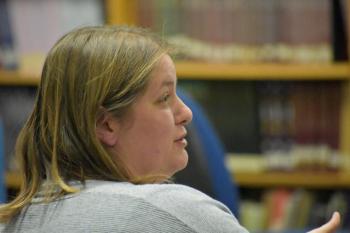 Edgecomb parent Krystle Hodgdon talks about the obstacles to the CSD’s success. JOSEPH CHARPENTIER/Boothbay Register
Edgecomb parent Krystle Hodgdon talks about the obstacles to the CSD’s success. JOSEPH CHARPENTIER/Boothbay Register
Lavallee Brensinger Architects (LBPA) launched its first series of school master plan meetings with the Community School District and the wider community Jan. 17 and 18. The Friday evening gathering focused on input from students' parents and Saturday morning’s focused on business leaders and the wider community.
LBPA’s Ron Lamarre said the meetings’ goal is to answer four important questions: What is significant about the schools? What are the top 10 desired outcomes defining success? What are the top 10 obstacles preventing desired outcomes? And what teaching, learning and training models are not supported by the existing learning environment?
“The goal is for us to understand the good, the bad and the ugly of all the school system … before we start trying to come up with solutions ... to say, ‘Here's what we look like in 20 years and here's why.’”
Between both meetings, most agreed the types of things the CSD must keep as the foundation to the schools include the student-teacher ratio and the individualized attention that comes from it. Boothbay Region Elementary School Assistant Principal Tricia Campbell added to that the one-of-a-kind special education program teacher Toby LeConte runs and the many other dynamic services BRES provides such as the resource program, emotional/behavior support programs, life skill programs, social/emotional early intervention programs, and various assistance services. “In fact, many school systems pay to find placement for students because they do not offer the (same) level of programming …”
Several audience members said school safety, specifically resource officer Larry Brown, is one of the strongest aspects of the CSD and should continue as it is. Community Center’s Sue Burge said Brown’s commitment to the well-being of students is likely to thank for many students becoming well adjusted to school life.
Girls basketball coach and parent Brian Blethen said he would like to see existing partnerships expanded upon with local organizations like Boothbay Region YMCA, LincolnHealth, Bigelow Laboratory, Coastal Maine Botanical Gardens and Boothbay Region Land Trust. Blethen also said the schools need to focus on the region’s greatest asset: “Our school is in one of the most beautiful places in the world … If we're talking about what's significant about us – we're sitting on the coast … It's part of our identity and being on a peninsula probably enhances that sense of community.”
Everyone agreed the biggest obstacles are money and declining enrollment. However, parent Lisa Markowitz said students would not necessarily agree money is what is holding the schools back.
“My daughter says 'Well, the kids have to be motivated.' They sit in class, yell at the teachers and they're acting like jerks … She sometimes struggles with being maybe the only kid in class that wants to do anything.”
Parent Laura Perkins agreed and said part of the reason classes with more academic rigor never catch on is because students who sign up for the class later decide it is not worth the work. Perkins said that is part of the reason her son, Will, does online classes and sees no point in staying at school if it can be done at home despite not having the atmosphere of a classroom and learning environment to support his study.
Lamarre said the answer to the gap between technology and the classroom may be “blended learning” – incorporating both media in the classroom – and the answer to students’ disinterest is “fun and fair.”
“If the school could figure out a way to make sure that when you get here in the morning it's going to be fun, are you coming,” Lamarre asked student Rowan Kristan. Kristan said yes. “If the schools figured out a way for you not to be in terror of college applications, grades, achievements, expectations, would you feel a lot more comfortable? Every student's the same: … They don't want to have that complete fear of 'My parents are going to kill me, my teachers are going to hate me, the kids are going to make fun of me because I'm not performing.'”
Saturday
Business owners, community leaders and educators brought more perspective to the questions Lamarre posed to educators and parents the night before. Omnihelios, LLC owner Tom Myette said there is a large disconnect between the schools and local merchants. “A lot of them don’t have families (and) that may explain in part why this room is relatively empty. In order for the school to thrive, we need to understand why there is that break and why are there not merchant families in town with kids in the school. That’s a significant voice to the community that’s missing.”
The audience discussed the lack of teenage workers and lack of exposure to trade-based careers like electric, plumbing and welding. Boothbay Region YMCA Executive Director Andy Hamblett said besides the hospitality industry and other seasonal vocations, there are still plenty of well-paying, year-round careers students could be exploring if the business community and schools could connect better.
Superintendent Keith Laser said one of the problems with taking any focus off of college preparation for vocational preparation is that most parents expect their local school to prepare teens for college. If 60% of a class of 40 are going to college, there are 16 students who are either entering the workforce, the military or a trade program. “… (But) until the mindset changes that a college degree is your ticket to success, it's going to be our mandate to prepare kids for college.”
Lamarre said all the questions people are bringing up are all the right ones, but the most important question ties the school community with the wider community: “… When we talk about what is significant about your school, we can broaden that and say 'what is significant about living here?' Everybody graduates from school, they go away to school and then they end up somewhere – well, where do they end up and why is it not here?”
Elephant in the room
The Friday and Saturday sessions had been in the works since mid-December and were promoted in several ways: Laser’s office dispersed fliers, posted to school websites and social media several times; in an editorial, Boothbay Register Editor Kevin Burnham urged readers to go; and an article from Laser’s office followed an article; Boothbay Harbor Region Chamber of Commerce featured the sessions in its newsletter; and educators and administrators spread the word at school board meetings and among colleagues and students’ parents.
Despite the efforts, only a dozen people showed for the Friday evening session and about as many showed for the Saturday morning sessions. Myette and Linekin Home Property Services owner Tom Minerich noted the absence of municipal officers at the Saturday morning meetings; Boothbay Harbor resident and CSD Trustee Steve Lorrain was more disappointed at the turnout as a whole. “For all the complaining and whining that I hear from all over the community about things that are happening, there's quite a few empty chairs here.”
If there are specific outcomes the community wants to see, then there needs to be participation, Lorrain continued. Myette said success may mean putting students and educators at the helm on what drives the region’s competitive advantage, but there needs to be more guidance on what that is.
Said Myette, “The school gets no direction in some ways from the towns in terms of 'what is our competitive advantage and what can we do to help?' That's a blunt statement, I know it is and I'm going to get hell for it, but I see it time and time again. Just in terms of attention at the selectmen levels, I don’t hear a lot of noise. I know everyone’s concerned, but I don’t hear a lot of pot-banging about the issues facing the schools and the solutions as much as I do about other issues.”
CSD Trustees Chair Richard Hallinan said attendance for public meetings has always been a struggle until the community finds the schools’ issues are becoming a tax issue. “When (the towns) knew we were going to vote on a $5 million bond for the heating system and other things, then everybody decided to come and then they were all experts on the situations.”
Campbell said the one thing everyone can count on from the communities in a time of need is group action. “We need to overcome this disconnect and really be able to put out: 'urgency: we need your help because this is a critical timel for our schools and we need to have these conversations.’”
Event Date
Address
United States

